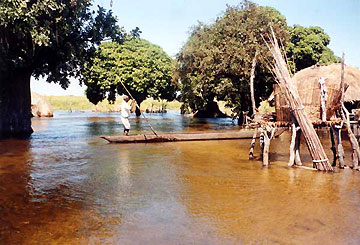
I am writing from Zambia. In its upper part, the Zambezi River, which flows through the south central Africa, has formed a floodplain in which the Lozi people live.
When the rainy season begins on the floodplain, the volume of water in the river slowly starts rising. Even villages formed on mounds of two to three meters higher than the surrounding area are gradually flooded, as shown in the photograph. In the beginning of the flood season, some of the villagers load their furniture and household items into dugout canoes, and escape from the floodplain. Majority of the people, however, stay behind. I am living with such people in a floodplain village, and experiencing the life during the flood season with them.
Even when floodwater comes into their houses, the Lozi people make no fuss. People who own steel-frame beds, brought from the town, sleep composedly while the floodwater flows beneath them. People who don’t own such beds create homemade ones by spreading mats on top of many layers of plant stems and logs. There are also people who move into temporary huts built in the narrow space on top of the mounds outside the village. These mounds were originally termite hills, and now conserved as the graveyards of the village’s founders. Yet since the level of the floodwater is higher than usual this year, the village headman gave the people permission to stay on the mounds.
“Life during the flood season is wonderful,” people say. I think there are several reasons for this. First, the maize harvest finishes just before the flood start, and it is the time of year when grain stocks are at their highest. What is more, when the water rises, fish comes on the dinner table every day. Further, the river water during the flood season isn’t muddy and there is no worry about water for household use. Finally, the cattle are transferred from the floodplain and put under the care of the people in other villages, leaving the locals free to enjoy themselves every day during the season.
One falls prey to the illusion that time flows very slowly, like the floodwaters. When the flood recedes, though, cultivation and livestock farming begin again and people starts working busily. I will write to you again during that time. |
 Postcards from the Field
Postcards from the Field